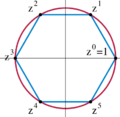Janko group J4
| Algebraic structure → Group theory Group theory |
|---|
 |
In the area of modern algebra known as group theory, the Janko group J4 is a sporadic simple group of order
- 221 · 33 · 5 · 7 · 113 · 23 · 29 · 31 · 37 · 43
- = 86775571046077562880
- ≈ 9×1019.
History
J4 is one of the 26 Sporadic groups. Zvonimir Janko found J4 in 1975 by studying groups with an involution centralizer of the form 21 + 12.3.(M22:2). Its existence and uniqueness was shown using computer calculations by Simon P. Norton and others in 1980. It has a modular representation of dimension 112 over the finite field with 2 elements and is the stabilizer of a certain 4995 dimensional subspace of the exterior square, a fact which Norton used to construct it, and which is the easiest way to deal with it computationally. (Aschbacher Segev) and (Ivanov 1992) gave computer-free proofs of uniqueness. (Ivanov Meierfrankenfeld) and (Ivanov 2004) gave a computer-free proof of existence by constructing it as an amalgams of groups 210:SL5(2) and (210:24:A8):2 over a group 210:24:A8.
The Schur multiplier and the outer automorphism group are both trivial.
Since 37 and 43 are not supersingular primes, J4 cannot be a subquotient of the monster group. Thus it is one of the 6 sporadic groups called the pariahs.
Representations
The smallest faithful complex representation has dimension 1333; there are two complex conjugate representations of this dimension. The smallest faithful representation over any field is a 112 dimensional representation over the field of 2 elements.
The smallest permutation representation is on 173067389 points, with point stabilizer of the form 211M24. These points can be identified with certain "special vectors" in the 112 dimensional representation.
Presentation
It has a presentation in terms of three generators a, b, and c as
- [math]\displaystyle{ \begin{align} a^2 &=b^3=c^2=(ab)^{23}=[a,b]^{12}=[a,bab]^5=[c,a]= \left ((ab)^2ab^{-1} \right)^3 \left (ab(ab^{-1})^2 \right)^3=\left (ab \left (abab^{-1} \right )^3 \right )^4 \\ &=\left [c,(ba)^2 b^{-1}ab^{-1} (ab)^3 \right]= \left (bc^{(bab^{-1}a)^2} \right )^3= \left ((bababab)^3 c c^{(ab)^3b(ab)^6b} \right )^2=1. \end{align} }[/math]
Maximal subgroups
(Kleidman Wilson) found the 13 conjugacy classes of maximal subgroups of J4 as follows:
- 211:M24 - containing Sylow 2-subgroups and Sylow 3-subgroups; also containing 211:(M22:2), centralizer of involution of class 2B
- 21+12.3.(M22:2) - centralizer of involution of class 2A - containing Sylow 2-subgroups and Sylow 3-subgroups
- 210:PSL(5,2)
- 23+12.(S5 × PSL(3,2)) - containing Sylow 2-subgroups
- U3(11):2
- M22:2
- 111+2:(5 × GL(2,3)) - normalizer of Sylow 11-subgroup
- PSL(2,32):5
- PGL(2,23)
- U3(3) - containing Sylow 3-subgroups
- 29:28 Frobenius group
- 43:14 Frobenius group
- 37:12 Frobenius group
A Sylow 3-subgroup is a Heisenberg group: order 27, non-abelian, all non-trivial elements of order 3.
References
- Aschbacher, Michael; Segev, Yoav (1991), "The uniqueness of groups of type J4", Inventiones Mathematicae 105 (3): 589–607, doi:10.1007/BF01232280, ISSN 0020-9910
- D.J. Benson The simple group J4, PhD Thesis, Cambridge 1981, https://web.archive.org/web/20110610013308/http://www.maths.abdn.ac.uk/~bensondj/papers/b/benson/the-simple-group-J4.pdf
- Ivanov, A. A. (1992), "A presentation for J4", Proceedings of the London Mathematical Society, Third Series 64 (2): 369–396, doi:10.1112/plms/s3-64.2.369, ISSN 0024-6115
- Ivanov, A. A.; Meierfrankenfeld, Ulrich (1999), "A computer-free construction of J4", Journal of Algebra 219 (1): 113–172, doi:10.1006/jabr.1999.7851, ISSN 0021-8693
- Ivanov, A. A. (2004). The Fourth Janko Group. Oxford Mathematical Monographs. Oxford: Clarendon Press. ISBN 0-19-852759-4.MR2124803
- Z. Janko, A new finite simple group of order 86,775,570,046,077,562,880 which possesses M24 and the full covering group of M22 as subgroups, J. Algebra 42 (1976) 564-596. doi:10.1016/0021-8693(76)90115-0 (The title of this paper is incorrect, as the full covering group of M22 was later discovered to be larger: center of order 12, not 6.)
- Kleidman, Peter B.; Wilson, Robert A. (1988), "The maximal subgroups of J4", Proceedings of the London Mathematical Society, Third Series 56 (3): 484–510, doi:10.1112/plms/s3-56.3.484, ISSN 0024-6115
- S. P. Norton The construction of J4 in The Santa Cruz conference on finite groups (Ed. Cooperstein, Mason) Amer. Math. Soc 1980.
External links
- MathWorld: Janko Groups
- Atlas of Finite Group Representations: J4 version 2
- Atlas of Finite Group Representations: J4 version 3
 |

